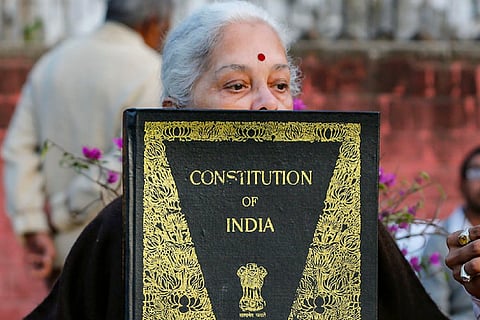

Amidst the sudden announcement of an extraordinary parliamentary session, a multitude of speculations have emerged regarding its underlying intent. A prevailing rumour suggests that the Bharatiya Janata Party government is poised to introduce a Bill enabling synchronised elections for both Legislative Assemblies and the Parliament. The establishment of a committee led by former President Ram Nath Kovind further bolsters this conjecture. For the past two decades, the BJP has advocated for simultaneous elections throughout India, encompassing parliament and assemblies. On January 29, 2018, Kovind underscored the concept of 'One Nation, One Election, One Voter List' during a joint session of both Houses of Parliament.
"Citizens who harbour concerns about governance are troubled by frequent elections in certain parts of the country. The nation's economy and development bear the brunt of such elections. Not only do frequent elections burden human resources, but they also impede the implementation of developmental initiatives due to enforced election codes of conduct. Thus, political parties should engage in discussions to forge consensus on conducting simultaneous elections for both the Parliament and the Assemblies," said Kovind.
Comparisons between Kovind’s speech and the Republic Day speech delivered in 2001 by the first Dalit President, KR Narayanan, are compelling. The notion of simultaneous elections isn't an 'original idea' attributed to Ramnath Kovind or Prime Minister Modi for reforming our country's electoral democracy. During Atal Bihari Vajpayee's tenure as Prime Minister from 1999 to 2004, Deputy Prime Minister LK Advani introduced this concept, even proposing the adoption of a presidential system of government for India. Recognising the peril in Advani's intentions, President KR Narayanan articulated his conviction in his 2001 Republic Day speech.
Emphasising the Constitution's guarantee of adult suffrage, he asserted that "power to govern this country should not remain concentrated in the hands of a select few." He recalled the trust our constitutional framers placed in the entirety of the population, entrusting governance to all citizens. Quoting Ambedkar, he highlighted the principle that "preferred more responsibility to stability," which led them to reject the notion of granting voting rights to a select few and opting against the system of indirect elections proposed in the 1935 Government of India Act.
Interestingly, in contrast, Pakistan's army chief Ayub Khan introduced a presidential government system under the guise of 'guided democracy'. Narayanan lamented, "It would be an irony of history if we invoke to-day in the name of Mahatma Gandhi, the father of the nation, the shades of the political ideas of Field Marshal Ayub Khan, the father of military rule in Pakistan." This speech effectively quelled Advani's aspirations of adopting a presidential system.
Prior to 1971, parliamentary and assembly elections coincided, occurring simultaneously since the general elections of 1952. This practice changed when Indira Gandhi's dominance in Congress grew, leading to the dissolution of Parliament a year before elections were announced. Changes in state boundaries and political upsets mandated staggered assembly elections. However, the BJP's assertion that the Law Commission endorses simultaneous elections sidesteps the opposition from former Chief Election Commissioners. Former Chief Election Commissioner JM Lingdoh vehemently protested, labelling the idea unconstitutional. He said the Election Commission lacked the structural capacity to execute such elections.
Similarly, former Chief Election Commissioner Qureshi questioned, "If the central government loses a no-confidence motion as it did in 1998, should all state legislatures dissolve when Parliament does?" If the BJP truly believes that frequent elections burden citizens and impede development, why did they dissolve state governments and call for elections during their own governance?
The committee established to draft the Fundamental Rights Clause in the Constitution recommended enshrining the conduct of elections as a Fundamental Right to prevent executive intervention. Acknowledging the importance of elections, the Constitution Bench entrusted autonomous bodies like the Election Commission with conducting them. The notion of elections remains intrinsic, necessitating only a single Permanent Election Commissioner.
While Ambedkar proposed that more commissioners could be appointed if necessary, Professor Shiban Lal Saxena from the committee asserted, "We haven't implemented a 'Fixed Term' like in the United States due to our elections occurring once every four years. Considering the numerous states in India, if a vote of no confidence succeeds, the government must resign. Therefore, elections for the Central Government and State Governments are necessarily held at different times. Simultaneous elections can occur for a period of ten to twelve years initially. Subsequently, sporadic elections will persist. Thus, we should appoint three to five election commissioners," he advocated.
Analysis of the Constituent Assembly's discourse reveals two clear insights: 1. The framers of our Constitution recognised elections as a fundamental right, devoid of administrative interference; and 2. They understood the inevitability of frequent elections and saw it as a positive attribute, not an impediment. They viewed it as indicative of a vibrant democracy. This reality is not unknown to the BJP, raising questions about their rhetoric. Is it an endeavour to nullify parliamentary democracy, consolidate power through simultaneous elections, and curtail the duration of Parliament/Assemblies, effectively placing voting power in the hands of the executive?
It is vital to grasp that the BJP's ambition for simultaneous elections for Parliament and Assemblies won't solely amplify bureaucracy; it will erode state parties and federalism. Between 1999 and 2014, 16 Assembly elections coincided with parliamentary elections. A study unveiled that 77 percent of voters supported the same party in both elections. In 1999, this trend was at 68 percent, escalating to 86 percent in 2014. Simultaneous elections would accentuate national issues, overshadowing regional concerns. National parties would assert dominance, sidelining parties advocating for marginalised segments and regional rights. This shift would undermine grassroots democracy, resulting in the disintegration of the Constitution's essence.
Dr D Ravikumar is a Member of Parliament (Lok Sabha) representing Villupuram constituency, Tamil Nadu.